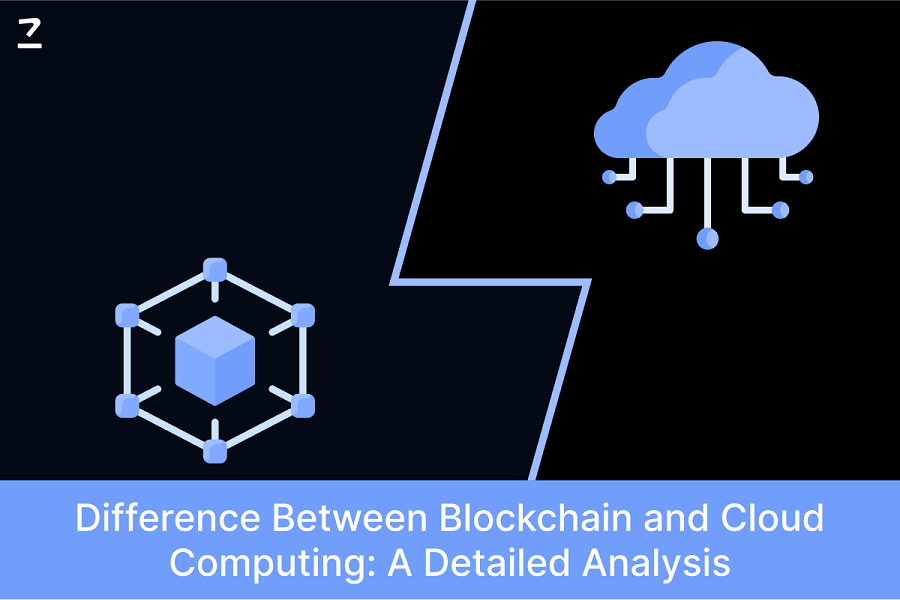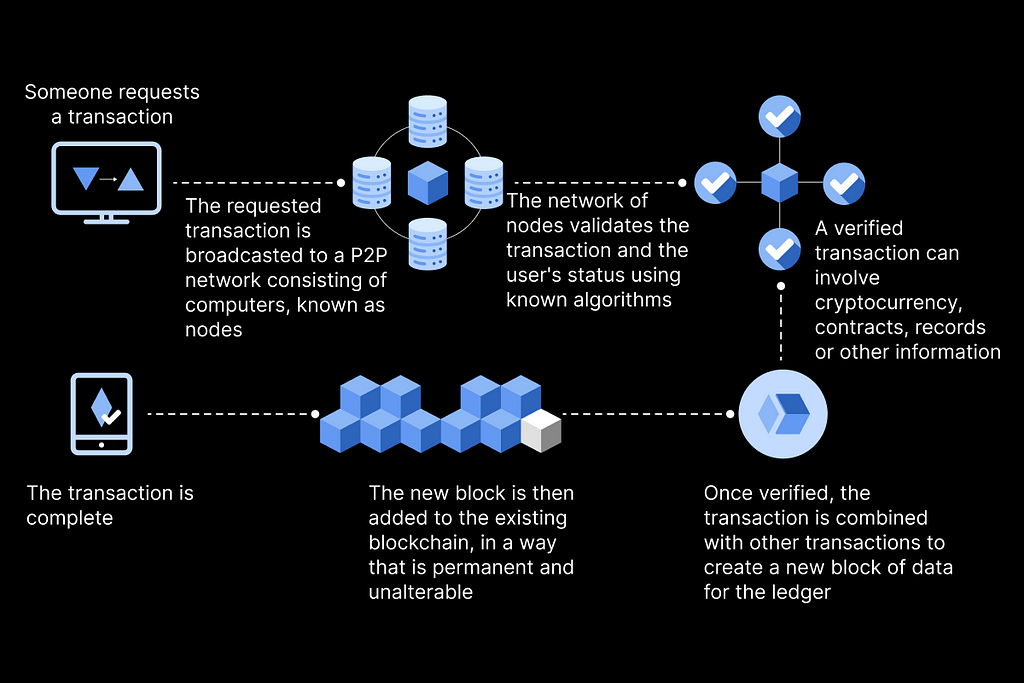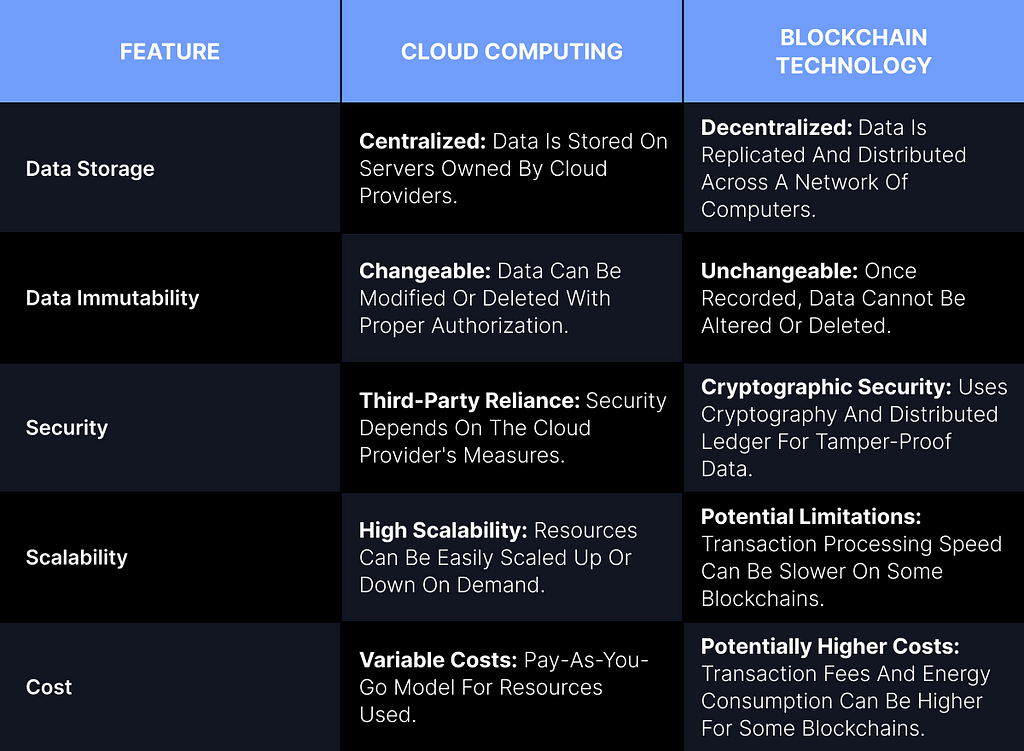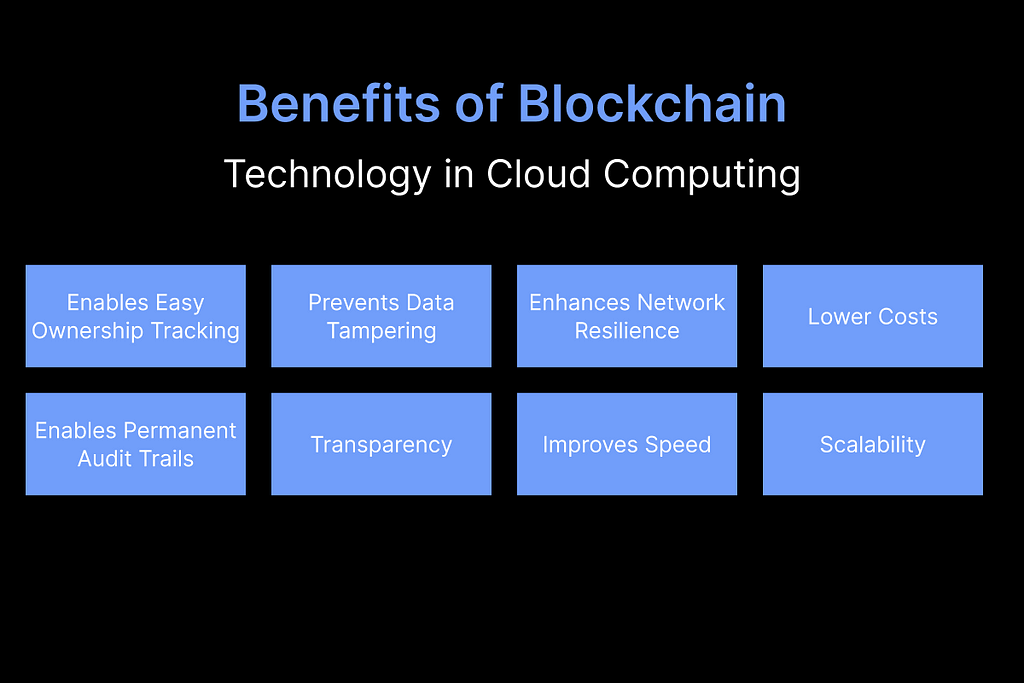
The amount of data we generate is staggering. By 2025, it’s estimated that the global digital data generated will reach an astounding 175 zettabytes — that’s 175 followed by 21 zeros! This explosion of information has brought great benefits, however, it has also raised critical questions about data security. Businesses as well as individuals are constantly searching for reliable solutions to store and manage their sensitive information.
Two technologies have come up as potential solutions — blockchain and cloud computing. Blockchain, with its distributed ledger system, promises tamper-proof data storage, while cloud computing offers scalable and on-demand access to resources. Cloud computing has been in prominence for quite a few years now, blockchain, more so in recent years. However, both fundamentally redefine how we store, manage, and interact with data.
Having said that, there is a pressing question — are blockchain and cloud computing interchangeable concepts? Or are they fundamentally different solutions? We’ll try and answer these questions in this guide. So stay tuned!
Understanding Cloud Computing
Cloud computing has become the foundation of modern IT infrastructure. In essence, it’s the on-demand delivery of IT resources — storage, processing power, databases, and even software — over the internet. Instead of managing physical servers and software licenses, businesses can rent these resources from cloud providers like Amazon Web Services (AWS), Microsoft Azure, or Google Cloud Platform. This model offers several core functionalities.
Apart from these core functionalities, cloud providers offer various service models to cater to different needs.
For businesses, cloud computing offers a compelling value proposition. Scalability is a key benefit — resources can be easily scaled up or down as business needs fluctuate. This eliminates the risk of over-positioning hardware and reduces overall IT costs. Moreover, cloud services are typically pay-as-you-go, further improving cost efficiency. Accessibility is another major advantage. Cloud-based applications and data can be accessed from any device with an internet connection, facilitating remote work and improved collaboration.
However, security considerations remain a critical aspect of cloud adoption. Data breaches can occur if proper security measures are not implemented. Furthermore, “vendor lock-in” can be a concern, where businesses become overly reliant on a specific cloud provider’s platform, making it difficult and costly to switch in the future.
Understanding Blockchain Technology
Cloud computing offers a flexible and scalable approach to data storage and access, but what if trust in a centralized authority is a concern? A Blockchain development company can solve this issue. At its core, blockchain is a distributed ledger — a digital record of transactions that is duplicated and distributed across a network of computers.
How It Works
Information is grouped into “blocks,” which are then cryptographically linked together in a chronological chain. Each block contains data about the transaction, a timestamp, and a unique fingerprint (hash) of the previous block. This creates a tamper-proof record, as any attempt to alter a block would invalidate the entire chain.

To ensure consistency and security across the network, a consensus mechanism is used. This mechanism determines how participants in the network agree on the validity of new transactions. Here are some of the more prominent consensus mechanisms.
- Proof of Work (PoW): This method requires miners to solve complex mathematical puzzles to add new blocks to the chain. While secure, PoW is computationally intensive and energy-consuming.
- Proof of Stake (PoS): Here, the likelihood of validating a block is based on the amount of cryptocurrency a user holds (their stake). This reduces energy consumption compared to PoW.
Advantages of Blockchain Technology
However, there are a few limitations of blockchain technology as well. Scalability is a major concern — processing transactions on a blockchain can be slower than traditional methods. Additionally, some blockchain implementations can be energy-intensive due to consensus mechanisms like Proof of Work.
Blockchain vs Cloud Computing
While both cloud computing and blockchain offer solutions for data storage and management, they operate on fundamentally different principles. Here’s a breakdown of their key differences.

Real-World Applications
The widespread adoption of digital technologies has altered data management and sharing practices. Cloud computing and blockchain technology are driving this transformation, each providing distinct advantages that are having a transformative impact on businesses across various sectors.
Cloud Computing’s Scalable Solutions
Cloud computing’s ability to provide on-demand, scalable resources makes it a preferred choice for several enterprise applications.
Blockchain’s Disruptive Potential
While cloud computing excels in managing and scaling IT resources, blockchain service providers disrupt industries by establishing trust and transparency in ecosystems where it has traditionally been lacking.
The Future Outlook — Convergence or Competition?
Cloud computing and blockchain occupy distinct niches within the technological space, but there’s a growing potential for them to work together synergistically.

Hybrid Cloud Models
The concept of hybrid cloud models or blockchain cloud technology is gaining traction. This approach taps into the strengths of both technologies — the scalability and flexibility of cloud computing alongside the security and transparency of blockchain. For instance, a business might store sensitive data on a private blockchain while utilizing cloud resources for everyday operations. This creates a secure and efficient data management ecosystem.
Cloud Providers Adopt Blockchain
Several major cloud providers are already exploring ways to integrate blockchain technology into their offerings. Microsoft Azure offers Blockchain as a Service (BaaS) solutions, allowing businesses to build and deploy blockchain applications on the Azure cloud platform. This trend is likely to continue, with cloud providers offering effective tools and infrastructure for developers building blockchain-based solutions.
Co-existence for a Secure and Efficient Future
Ultimately, cloud computing and blockchain are rather complementary solutions. Cloud computing provides the foundation for scalable and accessible data storage and processing power. Blockchain, on the other hand, offers a secure and transparent way to record and manage transactions. By tapping into their unique strengths these technologies can work together to create a more secure and efficient future for data management.
However, it is crucial for businesses to understand the distinct capabilities of cloud computing and blockchain technology. By choosing the right tool for the job, or even employing a hybrid approach, businesses can facilitate secure, transparent, and scalable data management for years to come.
At Codezeros, we can help you tap into both cloud and blockchain technologies to deliver innovative solutions. Whether you’re looking for secure and scalable cloud storage solutions, or blockchain-powered applications for improved transparency and trust, our team of experts can help you identify the right technology to meet your specific needs.
Contact us today for a free consultation to discuss your specific needs
Originally published at https://www.codezeros.com.
Difference Between Blockchain and Cloud Computing: A Detailed Analysis was originally published in Coinmonks on Medium, where people are continuing the conversation by highlighting and responding to this story.








